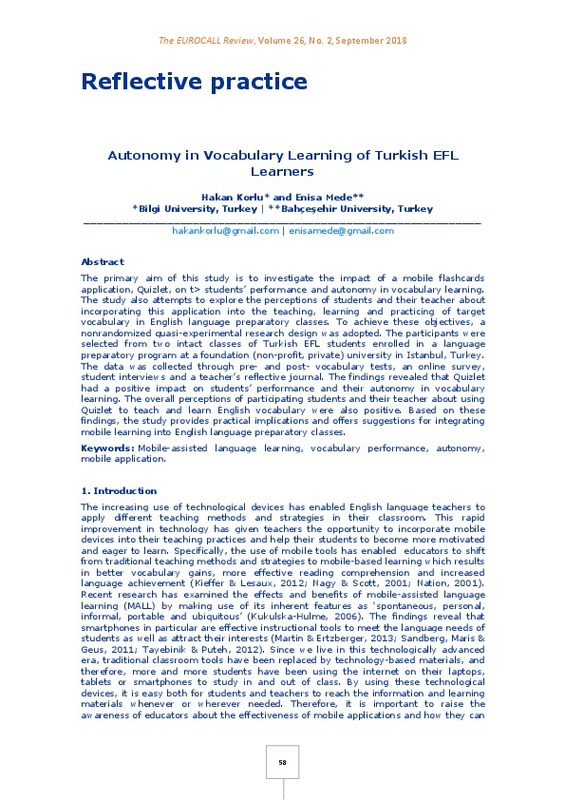Alavinia, P., & Qoitassi, K. (2013). On the viability of vocabulary learning enhancement through the implementation of MALL: The case of Iranian EFL learners. Journal of Language Teaching and Research, 4(2), 412-426. https://doi.org/10.4304/jltr.4.2.412-426
Al-Jarf, R. (2007). Teaching vocabulary to EFL college students online. CALL-EJ, 8(2), 1-16.
Altiner, C. (2011). Integrating a Computer-Based Flashcard Program into Academic Vocabulary Learning (Unpublished doctoral dissertation). Iowa State University, U.S. Retrieved from http://lib.dr.iastate.edu/cgi/viewcontent.cgi?article=1122 &context=etd.
[+]
Alavinia, P., & Qoitassi, K. (2013). On the viability of vocabulary learning enhancement through the implementation of MALL: The case of Iranian EFL learners. Journal of Language Teaching and Research, 4(2), 412-426. https://doi.org/10.4304/jltr.4.2.412-426
Al-Jarf, R. (2007). Teaching vocabulary to EFL college students online. CALL-EJ, 8(2), 1-16.
Altiner, C. (2011). Integrating a Computer-Based Flashcard Program into Academic Vocabulary Learning (Unpublished doctoral dissertation). Iowa State University, U.S. Retrieved from http://lib.dr.iastate.edu/cgi/viewcontent.cgi?article=1122 &context=etd.
Ary, D., Jacobs, L. C., Razavieh, A., & Sorensen, C. (2010). Introduction to research in education. Wadsworth: Cengage Learning.
Basoglu, E., & Akdemir, O. (2010). A comparison of undergraduate students' English vocabulary learning: Using cell phones and flash cards. The Turkish Online Journal of Educational Technology, 9(3), 1-7.
Burston, J. (2013). Mobile-assisted language learning: A selected annotated bibliography of implementation studies 1994-2012. Language Learning & Technology, 17(3), 157-224.
Cavus, N., & Ibrahim, D. (2009). M-Learning: An experiment in using SMS to support learning new English language words. British Journal of Educational Technology, 40(1), 78-91. https://doi.org/10.1111/j.1467-8535.2007.00801.x
Chu, H. (2011). The effect of the features of smart phone vocabulary applications on Korean college students' satisfaction and continued use. Multimedia Assisted Language Learning, 14(2), 91-112.
Clark, M. (2013). The use of technology to support vocabulary development of English Language Learners (Master's thesis). Retrieved from http://fisherpub.sjfc.edu/education_ETD_masters/238
Dizon, G. (2015). Quizlet in the EFL classroom: Enhancing academic vocabulary acquisition of Japanese university students. Teaching English with Technology, 16(2), 40-56.
Ghrieb, E. B. (2015). Teachers' and Students' Attitudes towards the Use of Mobile Assisted Language Learning: A case Study of Master One EFL Students and EFL Teachers at University of Mohamed Kheider of Biskra (Master's Thesis). Retrieved from http://dspace.univ-biskra.dz:8080/jspui/bitstream/123456789/5807/1/GHRIEB%20EL-Boukhari.pdf
Godwin-Jones, R. (2011). Emerging technologies: mobile apps for language learning. Language Learning & Technology, 15(2), 2-11.
Harmon, J. (2012). Unlock literacy with iPads. Learning and Leading with Technology, 39, 30-31.
Kálecký, R. (2016). Quizlet vs. Vocabulary Notebook: The Impact of Different Methods of Storing and Revising Vocabulary on Students' Progress, Retention and Autonomy (Master's Thesis). Masaryk University.
Kennedy, C. & Levy, M. (2008). L'italiano al telefonino: Using SMS to support beginners' language learning. ReCALL 20(3), 315-330. https://doi.org/10.1017/S0958344008000530
Kieffer, M. J., & Lesaux, N. K. (2012). Knowledge of words, knowledge about words: Dimensions of vocabulary in first and second language learners in sixth grade. Reading and Writing, 25, 347-373. https://doi.org/10.1007/s11145-010-9272-9
Kilickaya, F., & Krajka, J. (2010). Comparative usefulness of online and traditional vocabulary learning. TOJET: The Turkish Online Journal of Educational Technology, 9(2), 55-63.
Kinash, S., Brand, J., & Mathew, T. (2012). Challenging mobile learning discourse through research: Student perceptions of Blackboard Mobile Learn and iPads. Australasian Journal of Educational Technology, 28, 639-655. https://doi.org/10.14742/ajet.832
Kukulska-Hulme, A. (2006). Mobile language learning now and in the future. In P. Svensson (Ed.), Från vision till praktik: Språkutbildning och Informationsteknik (From Vision to Practice: Language Learning and IT) (pp. 295-310). Sweden: Swedish Net University (Nätuniversitetet).
Lys, F. (2013). The development of advanced learner oral proficiency using iPads. Language Learning & Technology, 17, 94-116.
Lu, M. (2008). Effectiveness of vocabulary learning via mobile phone. Journal of Computer Assisted Learning, 24(6), 515-525. https://doi.org/10.1111/j.1365-2729.2008.00289.x
Martin, F. & Ertzberger. J. (2013). Here and now mobile learning: An experimental study on the use of mobile technology. Computers & Education, 68, 76-85. https://doi.org/10.1016/j.compedu.2013.04.021
Mayer, R. E. (2005). The Cambridge handbook of multimedia learning. New York: Cambridge University Press. https://doi.org/10.1017/CBO9780511816819
McClanahan, B., Williams, K., Kennedy, E., & Tate, S. (2012). A breakthrough for Josh: How use of an iPad facilitated reading improvement. TechTrends, 56, 20-28. https://doi.org/10.1007/s11528-012-0572-6
McLean, S. Hogg, N., & Rush, T. W. (2013) Vocabulary learning through an online computerized flashcard site. The JALT CALL Journal, 9(1), 79-98.
Motallebzadeh, K., & Ganjali, R. (2011). SMS: Tool for L2 vocabulary retention and reading comprehension ability. Journal of Language Teaching and Research, 2(5), 1111-1115. https://doi.org/10.4304/jltr.2.5.1111-1115
Nagy, W. E., & Scott, J. A. (2001). Vocabulary processes. In M. L. Kamil, P. D. Pearson, & R. Barr (Eds.), Handbook of reading research, vol. 3 (pp. 269-284). Mahwah, NJ: Lawrence Erlbaum Associates, Inc.
Nation, I. S. P. (2001). Learning vocabulary in another language. Cambridge, UK: Cambridge University Press. https://doi.org/10.1017/CBO9781139524759
Oblinger, D. (2005). Learners, learning & technology. EDUCAUSE Review, 40(5), 67-75.
Paivio, A. (1971). Imagery and Verbal Processes. New York: Holt, Rinehart & Winston.
Sandberg, J., Maris, M., & Geus K. (2011). Mobile English learning: An evidence-based study with fifth graders. Computers & Education, 57, 1334-1347. https://doi.org/10.1016/j.compedu.2011.01.015
Saidouni, K., & Bahlouol, A. (2016). Teachers and Students' Attitudes towards Using Mobile-Assisted Language Learning in Higher Education. Arab World English Journal (AWEJ) Special Issue, 3, 123-140. https://doi.org/10.2139/ssrn.2822983
Stockwell, G. (2010). Using mobile phones for vocabulary activities: Examining the effect of the platform. Language Learning & Technology, 14(2), 95-110.
Thornton, P., & Houser, C. (2005). Using mobile phones in English education in Japan. Journal of Computer Assisted Learning, 21(3), 217-228. https://doi.org/10.1111/j.1365-2729.2005.00129.x
Wang, B. T., Teng, C. W., & Chen, H. T. (2015). Using iPad to facilitate English vocabulary learning. International Journal of Information and Education Technology, 5, 100-104. https://doi.org/10.7763/IJIET.2015.V5.484
Zhang, H., Song, W., & Burston, J. (2011). Reexamining the effectiveness of vocabulary learning via mobile phones. TOJET, 10(3), 203-214.
[-]







![HTML file [HTML]](/themes/UPV/images/html.png)

